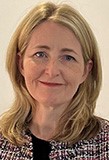ACR Journals on Air Podcast

Welcome to ACR Journals on Air, the ACR’s newest podcast series featuring interviews, commentary, and analysis on research from our three peer-reviewed journals: Arthritis & Rheumatology, Arthritis Care & Research, and ACR Open Rheumatology. Join us each episode for engaging discussions with authors and independent experts about recently published studies, their implications for clinical care, and how they move the field of rheumatology forward.
Whether it’s an expert analysis of a manuscript or deep dive with an author—our goal is the same—to understand the impact of the science and bring it from the bench to the bedside.
Podcast Host

Victoria Shanmugam, MBBS, MRCP, CCD, has clinical expertise caring for patients with autoimmune diseases, vasculitis, and chronic wounds. She has led several research studies investigating scleroderma, hidradenitis suppurativa, and the interplay of the host immune response and the microbiome in chronic wounds. Dr. Shanmugam is a frequently invited speaker at professional meetings. Her work in wound healing, hidradenitis, and scleroderma has been published in high-impact peer-reviewed journals, such as Arthritis Care and Research, Current Opinion in Rheumatology, International Wound Journal, and Clinical Rheumatology. Connect with Dr. Shanmugam on Twitter (@VickiShanmugam).
Episodes
New episodes will be available twice a month on Tuesdays.
Episode 84 – Fecal Metabolome in Early Systemic Sclerosis
Episode 83 – Mortality in RA Patients Treated with Immune Checkpoint Inhibitors (ICIs)
Episode 82 – JDM Treat to Target
Episode 81 – TNF Inhibitors and Risk of Serious Infection in Pregnancy
Episode 80 – What Are the Predictors for Difficult to Treat RA?
Browse previous episodes in the ACR Journals on Air archive.
Episode Show Notes
In this episode, Elizabeth R. Volkmann, MD, MS, discusses emerging research on the gut microbiome in systemic sclerosis, building on findings from early-diagnosis and prior microbiome studies. She explains her team’s analysis of microbiome-derived metabolites, including short-chain fatty acids, and their potential role in symptom development, highlighting key findings, clinical implications, and study limitations. The conversation also touches on holistic patient care, international collaboration, and her perspective on the future of systemic sclerosis research and treatment.

Elizabeth R. Volkmann, MD, MS – Elizabeth R. Volkmann, MD, MS, is an Associate Professor in the Division of Rheumatology at University of California, Los Angeles, where she serves as the Director of the UCLA Scleroderma Program and the founder and Co-Director of the UCLA Connective Tissue Disease-Related Interstitial Lung Disease (CTD-ILD) Program. Her research focuses on the discovery of novel biomarkers that predict response to ILD-targeted therapies. She also has an enduring interest in exploring how the gut microbiome contributes to the pathogenesis of ILD and systemic sclerosis. Dr. Volkmann is the proud founder of Women in Scleroderma (WINS), a nonprofit organization dedicated to advancing the careers of women scientists and clinicians working in this field.
Related Links:
- Characterization of the Fecal Metabolome in Patients With Early Systemic Sclerosis
- Women in Scleroderma (WINS)
Don’t forget to like, share, and subscribe!
In this episode, Madeline O'Sullivan, MD, discusses her retrospective study of US veterans in the Veterans Health Administration, examining outcomes among patients with rheumatoid arthritis treated with immune checkpoint inhibitors for cancer. She explains how the cohorts were defined, how use and timing of immunosuppressive therapies were analyzed, and how mortality and cause of death were determined. Dr. O’Sullivan summarizes the patient population, cancer types represented, and key findings on survival differences between RA and non-RA groups, as well as insights from secondary analyses and important study limitations. She also reflects on balancing research with clinical training, the mentorship that supported her work, lessons learned, and practical advice for trainees aiming to complete and publish research projects.

Madeline O'Sullivan, MD – Madeline O'Sullivan, MD, is a second-year rheumatology fellow at the University of Utah. She is actively involved in clinical research with a focus on rheumatologic-related adverse events secondary to immunotherapy.
She completed her undergraduate studies in psychology and human development at Duke University. Following graduation, she worked as a research coordinator at the Duke Pain Prevention & Management Program. She completed medical school at the University of Oklahoma then moved to Salt Lake City for internal medicine residency at the University of Utah and served as a chief medical resident prior to starting fellowship training. Dr. O'Sullivan is board-certified by the American Board of Internal Medicine and a member of the American College of Rheumatology and the American College of Physicians.
Related Links:
Don’t forget to like, share, and subscribe!
In this episode, we speak with Jayne MacMahon, MB BCh, BAO, FRCPCH, about an international collaborative study in juvenile dermatomyositis (JDM) involving pediatric rheumatology centers in Genoa, Italy, and Toronto, Canada. She discusses the study’s motivation, key disease activity measures, treatment targets, and definitions of remission, along with major findings on time to remission, steroid exposure, and treatment outcomes across cohorts. Dr. MacMahon also reflects on the study’s limitations, future research directions, her career path in pediatric rheumatology, and how international collaboration can shape the future of care for children with autoimmune diseases.

Jayne MacMahon, MB BCh BAO, FRCPCH – Jayne MacMahon, MB BCh BAO, FRCPCH, is a consultant and pediatric rheumatologist, currently based at Addenbrooke’s Hospital, Cambridge, England.
Dr. MacMahon completed her initial pediatric training in Ireland. In 2020, she moved to Toronto to undertake a pediatric rheumatology clinical fellowship at SickKids. During this time, she became particularly interested in myositis and went on to complete a clinical research fellowship in childhood myositis, under the supervision of Dr. Brian Feldman. Her most recent publications include research on the use of interferon scores in patients with Juvenile Dermatomyositis (JDM) and the JDM treat to target initiative.
Related Links:
Don’t forget to like, share, and subscribe!
In this episode, we sit down with Évelyne Vinet, MD, PhD, about a new study examining whether TNF inhibitors increase the risk of serious infections during pregnancy among women with chronic inflammatory diseases. Using large real-world data from the MarketScan database, the discussion explores how pregnancy, inflammatory disease, TNF inhibitor exposure, and serious infections were defined, how confounders were addressed, and what the data reveal across pregnancy and the postpartum period. Dr. Vinet also reflects on study limitations, the impact of COVID-19, and her broader work on pregnancy outcomes and long-term child health in rheumatic diseases, offering insights for clinicians and researchers alike.

Évelyne Vinet, MD, PhD – Évelyne Vinet, MD, PhD, is an associate professor in the Division of Rheumatology at McGill and Co-Director of the McGill Lupus Research Clinic. She leads the McGill Reproductive Rheumatology Clinic. Dr. Vinet is also a medical scientist for the Centre for Health Outcomes Research at the Research Institute of the McGill University Health Centre, a member of the McGill Department of Epidemiology, Biostatistics and Occupational Health, as well as member of the McGill Department of Medicine, Division of Clinical and Translational Research.
The primary goal of Dr. Vinet’s research program is to use epidemiologic methods to improve reproductive health outcomes in women with rheumatic diseases, such as systemic lupus erythematosus (SLE) and rheumatoid arthritis (RA), and their offspring. To this end, Dr. Vinet has created the world's largest cohort of offspring born to SLE women, which has driven her novel findings demonstrating that SLE offspring are at increased risk of autism spectrum disorders, congenital heart defects, and stillbirths. Dr. Vinet is also actively spear-heading research initiatives to elucidate how therapies used to treat rheumatic diseases (e.g. TNF inhibitors and other biologics) impact health outcomes in these patients and their offspring. Finally, Dr. Vinet is leading an international multi-centre prospective cohort study, the “Lupus in prEGnACY (LEGACY).” cohort, to ultimately establish early risk stratification and personalized therapy of lupus pregnancies.
Related Links:
Don’t forget to like, share, and subscribe!
In this episode, we explore why rheumatoid arthritis matters to the broader public, with a focus on difficult-to-treat RA (D2T-RA)—what it is, how often it occurs, and why early identification is critical. Our guest demystifies common RA research terms and outcome measures, introduces the real-world data sets behind the study, and explains—in plain language—how a predictive model was developed using modern statistical tools. We discuss the key risk factors for D2T-RA, including which findings were surprising, as well as the study’s major strengths and limitations. The conversation wraps up with thoughts on how this work may shape future research, the potential role of AI in risk modeling, and practical advice for early-career researchers on balancing productivity and sleep.

Misti Paudel, PhD, MPH – Misti Paudel, PhD, MPH, is an epidemiologist and quantitative methodologist at Brigham and Women’s Hospital and Assistant Professor of Medicine at Harvard Medical School. Dr. Paudel is a member of the VERITY Methodology Core which provides biostatistical and methodological support to trainees and early investigators in the BWH Division Rheumatology and the broader rheumatological research community, and a Co-Investigator for the Brigham and Women’s Hospital Rheumatoid Arthritis Sequential Study (BRASS). Prior to joining BWH, Dr. Paudel spent several years of her professional career in a combination of academic, not-for-profit, and for-profit organizations, gaining research expertise across multiple therapeutic areas and methods. Dr. Paudel’s research at Brigham is on the epidemiology of difficult-to-treat rheumatoid arthritis and clinical risk prediction models.
Don’t forget to like, share, and subscribe!
